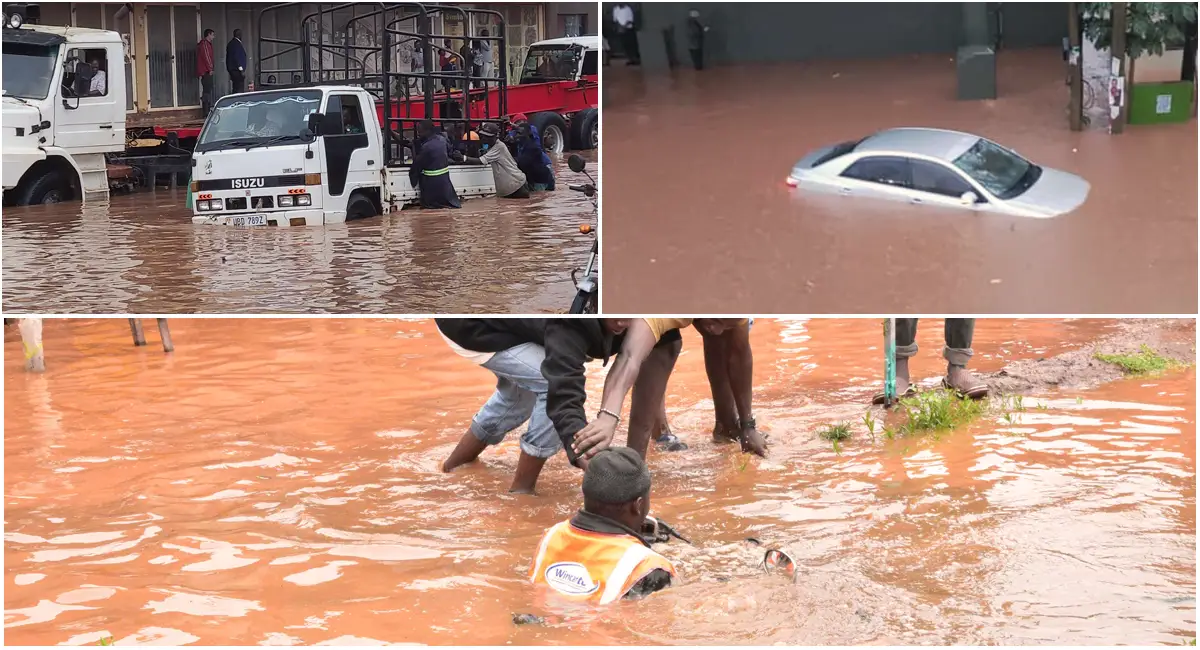
Kampala, October 6, 2025 – As heavy afternoon rains lashed Uganda’s capital, the bustling heart of downtown Kampala ground to a halt. Water surged into shopping arcades, streets, and roads, submerging shops, stranding pedestrians, and parking vehicles in a scene eerily reminiscent of the city’s recurring nightmare. Photos circulating on social media captured the deluge: knee-deep floodwaters turning vibrant markets and taxi parks into makeshift lakes, with vendors hastily stacking goods on counters while customers waded through the muck.
Accompanying these stark images are two familiar names, Erias Lukwago, the Kampala Lord Mayor, and Hamis Kiggundu, the businessman behind the controversial redevelopment of the Nakivubo Channel. The two have been locked in a heated dispute over the project, which has once again come under scrutiny after today’s floods.
Lukwago has accused Kiggundu of illegally grabbing public land and warned that enclosing the channel could worsen flooding by blocking natural water flow and undermining environmental safeguards. He insists the project sets a dangerous precedent for Kampala’s drainage infrastructure.
Kiggundu, through his company Kiham Enterprises, maintains that the Nakivubo redevelopment is aimed at modernising the city. He envisions transforming the area into a modern commercial hub with underground drainage, waste filtration, and eco-walkways, claiming it will eventually reduce flooding and stimulate economic growth. The controversy deepened in August 2025 when Kiggundu fenced off the site, following what he said was a presidential endorsement from President Yoweri Museveni. The dispute has since drawn in the Kampala Capital City Authority (KCCA), environmental regulators, and opposition leaders, reflecting sharp divisions in the governance of Uganda’s capital, Kampala.
When @EriasLukwago_ made the alarm against @KiggunduHamis stealing Nakivubo Channle, there were some busybodies who were saying he was failing development. The rains were small today but this is what we have. I knew Ham is always a scum! pic.twitter.com/bQEadG7cxA
— Batte Baker Lule (@BakerbatteLule) October 6, 2025
Even though it is not the only reason Kampala floods whenever it rains, the Nakivubo Channel remains the city’s main drainage channel and outflow for stormwater. Any disruption to it, whether by construction, blockage, or enclosure, can significantly impact the city’s drainage. Recent observations show that Kiggundu’s ongoing works have narrowed parts of the channel, likely contributing to today’s overflow into shops in downtown Kampala and roads during the downpour.
Kampala’s vulnerability, however, goes far beyond Nakivubo. The city’s low-lying topography, the fact that much of downtown Kampala was originally a swamp, clogged drainage from garbage dumping, and poorly maintained infrastructure continue to compound the problem. Experts have also warned that intense rainfall linked to climate change, including downpours exceeding 80mm in a single storm, now overwhelms the city’s outdated systems.
Protecting the gains innit? pic.twitter.com/JOC3Naj2mv
— Bakhit™ (@bakhitmiqdad) October 6, 2025
As Lukwago and Kiggundu continue their standoff over Nakivubo, business owners, already weighed down by soaring rent and rising URA taxes, are left to count their losses. Holding a bucket to scoop water out of his shop, one arcade vendor in downtown Kampala lamented, ‘We’ve invested everything here, only for floods to wipe it out every season,’ reflecting the frustration spreading across the city’s commercial core.
On social media, users described today’s flooding as “absurdly normal,” questioning why such incidents keep happening year after year. Many are now calling for urgent reforms, stricter wetland protection, improved waste management, and sustainable urban planning that can withstand Kampala’s heavy rains.
“UgANdanS wILl fIgHt aNyThINg deVeLoPmeNtAl” pic.twitter.com/oOMGfqVrrZ
— Useful Idiot (@ZeeroBrain) October 6, 2025